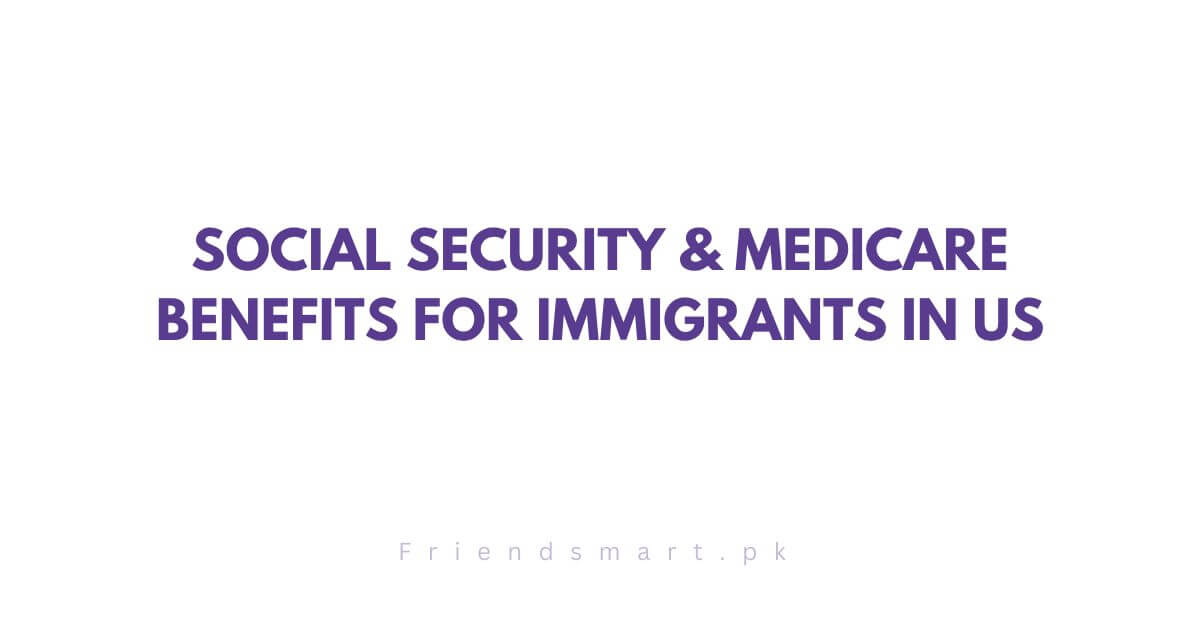Social Security & Medicare Benefits For Immigrants in US 2024
Social Security and Medicare are two of the publicly funded benefits that American laborers eagerly anticipate receiving during their retirement. These programs are generally financed by employees and their employers over the course of their careers. Immigrants who have maintained lawful employment in the United States are, in general, entitled to the same benefits.
Immigrants who meet the necessary eligibility requirements are deemed eligible to obtain benefits under Medicare and Social Security. While the two programs share some similarities, they have distinct objectives. Medicare provides senior citizens with health insurance, whereas Social Security primarily finances retirement income. A significant proportion of non-immigrant laborers, permanent residents, and US citizens utilize these benefits.
Check Also: H-1B Cap Registration Period Extended – USA Visa
Social Security & Medicare Benefits For Immigrants in US
Social Security is not an Employment Authorization
A considerable number of recently arrived immigrants erroneously perceive Social Security as a form of employment authorization. Working in the United States does not require a Social Security Number. In general, noncitizens who have been authorized to labor in the country by the Department of Homeland Security (DHS) are the only ones eligible to obtain an SSN.
While a Social Security Number (SSN) is generally a prerequisite for employment, it does not confer the authority to work. SSNs are utilized to submit an individual’s salary to the US government and to verify eligibility for social security benefits. Applicants for work authorization or a green card in the United States typically receive a social security number and card.
Alternatively, you must possess a lawful immigration status that grants you the ability to gain employment. In each of these instances, the request for a social security card is associated with the Form I-765 application for employment authorization and the Form I-485 application to modify status.
Social Security Benefits
Certain disabled and retired Americans, along with their spouses, children, and survivors, are provided financial assistance by the United States government via the Social Security Administration. Congress established the Social Security benefits program to provide a partial replacement income to disabled individuals, older laborers, and their spouses, individuals whose spouse or qualified ex-spouse has passed away, and those who are disabled under specific circumstances.
The offspring of the beneficiaries also receive assistance. In general, individuals who have made contributions to the Social Security program throughout their working years are qualified to obtain benefits. Typically, in order to acquire full insurance coverage, one must accumulate credits equivalent to ten years, forty quarters, or wages that are insured. As a consequence, the majority of geriatric immigrants who enter the country are ineligible for social security benefits; conversely, employed younger immigrants are typically eligible.
Totalization Agreements
The United States and several other nations have entered into totalization agreements for Social Security. A totalization agreement is a bilateral accord established between two countries with the purpose of ensuring that employees do not incur social security taxes on identical income earned in both countries. Moreover, it prevents individuals from being granted benefits redundantly.
Legal immigrants with sufficient labor credits from another country may still qualify for social security payments, even if they have not yet accumulated the required number of credits in the United States. A significant proportion of immigrants who arrive in the United States after reaching retirement age lack the forty-plus work credits required to qualify for Social Security.
Nevertheless, pro-rated US Social Security benefits may be available to individuals who are able to lawfully labor in the United States for a year and a half after their arrival, in accordance with a totalization agreement with their home countries.
The United States has entered into a totalization agreement with the nations listed below:
- Australia
- Austria
- Belgium
- Brazil
- Canada
- Chile
- Czech Republic
- Denmark
- Finland
- France
- Germany
- Greece
- Hungary
- Iceland
- Ireland
- Italy
- Japan
- Luxembourg
- The Netherlands
- Norway
- Poland
- Portugal
- Slovak Republic
- Slovenia
- South Korea
- Spain
- Sweden
- Switzerland
- United Kingdom
- Uruguay
Collecting Social Security Abroad
Social Security payments are available to immigrants who have accumulated the mandatory 40 labor credits while residing in the United States, notwithstanding their eventual decision to return home. Immigrants who have qualified for the benefit and earned it are permitted to collect Social Security in another country.
The social security system comprises a multitude of complex regulations and procedures. An enormous proportion of foreign laborers in the United States are eligible to receive Social Security benefits. Earned contributions should be incorporated into one’s retirement plan.
Medicare Benefits
Medicare, established in the United States, is the national health insurance program for individuals aged 65 and above. Medicare benefits only provide partial financial assistance towards medical expenses. Parts A, B, C, and D are the various sections that address distinct expenses.
Supplemental Medicare insurance Benefit recipients who are enrolled in Medicare Parts A and B may acquire a Medigap policy from a private insurance company. Medicare-deductible-exceeding expenses, such as co-payments, co-insurance, and deductibles, are covered by Medigap. Medicare benefits may also be accessible to individuals under the age of 65 who have certain disabilities.
Medicare benefits have different categories called parts;
- Part A hospital insurance assists in the financial coverage of inpatient hospital treatment or short-term care in a skilled nursing facility subsequent to a hospital visit. Hospice care and additional in-home medical services are also included.
- Certain preventative services, home health care, durable medical equipment, and services rendered by physicians and other healthcare professionals are all covered by Part B medical insurance.
- Component D Medicare prescription medication coverage provides partial coverage for the costs of prescription drugs. It is managed exclusively by commercial insurance providers in accordance with Medicare Part C requirements. Formerly known as a Medicare Advantage plan, this plan provides access to all the services and benefits offered by Medicare Parts A and B. Private insurance providers bundle all of the aforementioned benefits into a single policy.
Eligibility for Medicare Benefits for Immigrants
Medicare Part A may be accessible to permanent inhabitants and citizens of the United States who have reached the age of 65 or older. At age 65, the majority of individuals who satisfy one of the following criteria are eligible to receive part A free of charge:
- You are eligible to receive Social Security benefits or receive them.
- Whether divorced or living, your spouse is eligible for or currently receives Social Security benefits.
- You or your companion must have worked for the government for a sufficient amount of time to qualify for Medicare taxes.
- As a dependent parent, you are purchasing Medicare on behalf of a completely covered deceased child.
Medicare per day eligibility may be available to you even if none of the aforementioned conditions are met. Generally, this coverage is available for a monthly premium only during designated enrollment periods.
Individuals who are permanent inhabitants at least 65 years old and do not meet the aforementioned criteria for free Medicare coverage may qualify for coverage by satisfying one of the subsequent conditions:
- A recent naturalization has resulted in your obtaining United States citizenship.
- At least five years have passed since you became a lawful permanent resident of the United States.
As a result, newly arrived immigrants generally lack eligibility for Medicare benefits. Possessing a green card will likely require ten years of employment in order to qualify for free Medicare; receiving the program will require an additional five years of waiting.
Frequently Asked Questions:
-
What benefits do immigrants get when they come to America?
The list of 31 HHS programs includes Medicaid, the Children’s Health Insurance Program (CHIP), TANF, Foster Care, Adoption Assistance, the Child Care and Development Fund, and the Low-Income Home Energy Assistance Program.
-
Who is eligible for Social Security in the USA?
You can receive Social Security benefits based on your earnings record if you are 62 or older or a person with a disability or blindness and have enough work credits. Family members who qualify for benefits on your work record do not need work credits.
-
Does every US citizen qualify for Social Security?
No. Still, American workers who will not qualify for Social Security retirement benefits are relatively rare. If you are one of them, it’s important to know so you can secure other sources of income or determine whether it’s possible for you to become eligible.







